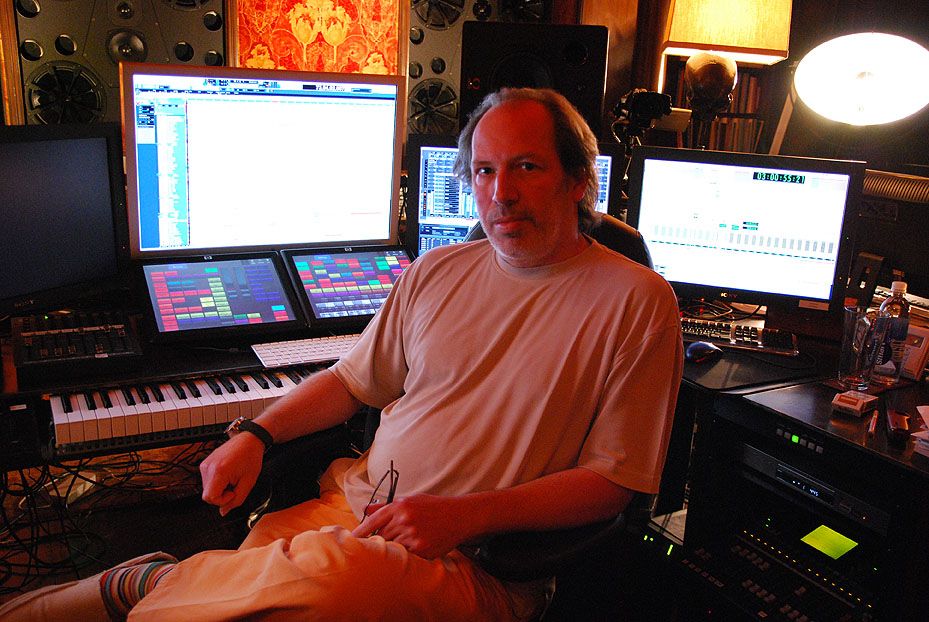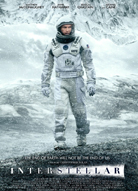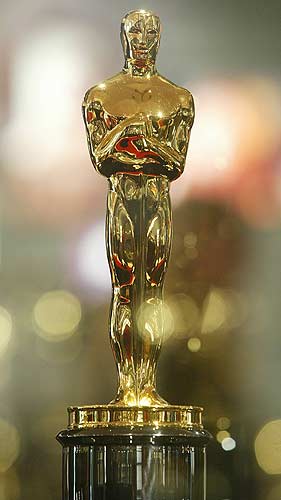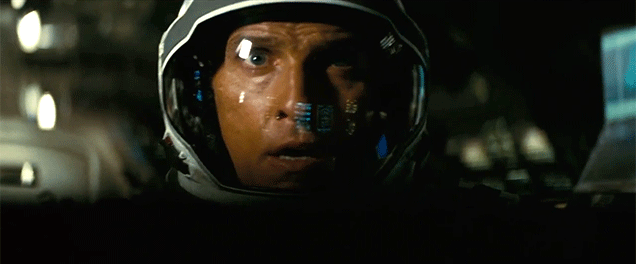An Interview with Hans Zimmer
 Tuesday, February 17, 2015 at 12:30PM
Tuesday, February 17, 2015 at 12:30PM
Anne Marie here with an observation: Hans Zimmer's studio is incredible. The ten-time Academy Award nominated composer has furnished his studio in a manner that fits the man who wrote the dramatic scores to Inception, Gladiator, and the Dark Knight trilogy. The walls are deep red, and lined with dark wood bookshelves bursting with books, albums, candles, and knick knacks. Light filters through stained glass-covered hanging lamps. Overstuffed couches and chairs sit on a raised platform. Clashing with this rustic scene are the walls of musical instruments, blinking sound equipment, and Zimmer's high tech work station. It's a lot to take in.
When I'm led into the room for an interview, I'm still recovering from car trouble. I'd been listening to Zimmer's Oscar-nominated score for Interstellar in the car, which had somehow led to my car stalling on the highway. Miraculously, I'm not late. When I meet Hans Zimmer, he is deservedly proud of his workspace, and immediately launches into conversation. Zimmer speaks animatedly of his decorating philosophy, decades-long partnership with Chris Nolan, the trouble with organs, and why he loves the Academy.

Anne Marie: This is an amazing room. This is quite possibly the coolest room I have ever been in.
Hans Zimmer: No, but hang on. There’s a reason. There’s a pragmatic reason: If you had to spend 98% of your life in one room, you might as well have some fun with it. Do you agree?
Anne Marie: I absolutely agree!
Hans Zimmer: And you know what, sometimes we just move the furniture out of this way and let the musicians come in, and we just start playing, and wow! Music!
Anne Marie: Oh my goodness! Talk about a great creative space.
Hans Zimmer: And that was, that was partly why I did it. I was sitting with this wonderful editor, Richie Marks, y’know [he] worked on Apocalypse Now, and all the Jim Brooks movies, Penny Marshall [films], The Godfather too. I’m sitting on the couch in his cutting room, I’m sort of leaning back, and I’m looking at the--what do you call those, y’know the ceiling with the sort of… they look like cottage cheese.
Anne Marie: Ceiling tiles I think?
Hans Zimmer: Right? It’s horrible! And the walls, which have this y’know horrible hospital color, and I’m thinking, “This great man is trying to create art!” and y’know the bad linoleum floor. Y’know? And this is, this is, this is, every day he has to go to this horrible room! So, Richie doesn’t actually know this, but it was really partially because I thought, “Poor Richie, in this horrible environment! I’m going to do my own!”
Anne Marie: Well from such an environment, I can see where something dramatic like Interstellar came from. I have to admit, my car stalled on the way here while I was listening to the Interstellar soundtrack!
Hans Zimmer: [Laughs] It’ll do that to cars!
[Interstellar and Oscar Love after the jump...]
Anne Marie: I was driving down the 405, I got to the big swell--
Hans Zimmer: You’re kidding me!
Anne Marie: I got to the big crescendo, and just everything went dead. And I had a moment where I was like, “I don’t remember this happening in the movie.” [Laughs] And then I realized my car wasn’t moving! So your score actually stalled my car.
Hans Zimmer: Okay, we--I know we actually blew up an IMAX theater.
Anne Marie: You blew up an IMAX theater too?
Hans Zimmer: I know, I know. Um… [Sighs] I’m very sorry. I apologize. [Laughs] Maybe we should put like a health warning or something.
Anne Marie: Well before my car stalled, I was thinking that it had been a while since I heard an organ in a film soundtrack.
Hans Zimmer: Well, we wanted to make it an experience, y’know? And it’s real! It’s not synthesized. The organ, it’s a piece of 17th century technology, which is part of why I wanted to use it. Not because it was going to make your car stall, but the idea of this beast. That at the same time it could, could make a car stall [laughs], but on the other hand it could be so lonely and so gentle. And the, the only thing that could make it work was breath. An organ cannot exist--like a human being--without air, y’know? That’s what makes the sound. And… I don’t know. I just thought it was a nice metaphor for where we were trying to go with this.
 Anne Marie: When you say “we,” you mean your collaboration with Christopher Nolan?
Anne Marie: When you say “we,” you mean your collaboration with Christopher Nolan?
Hans Zimmer: It’s Chris Nolan who makes it a wonderful journey, who protects me, who protects my space. The way I look at it is: we made this score. Everything is “we.” People always talk about film being a collaborative medium, and then in a peculiar way they put the composer outside of that group, y’know? Because he speaks a different language. But the way Chris and I work is: he sits on my couch and we’re chatting about things, and I turn around and when I really need to say what I need to say, I need to stop speaking in words and I play. That’s probably the only time I feel I can truly communicate what I want to say.
Anne Marie: Do you think that because composers tend to come in in postproduction, that might be part of the reason why people don’t give them the same credit?
Hans Zimmer: Well you know when I came in on this.
Anne Marie: Yeah! You came in on the very beginning with a typewritten letter!
Hans Zimmer: This is part of the game that Chris and I play for each other. Him saying to me, “If I write you one page, will you give me one day? But I won’t tell you what the movie is about” was great. And literally that conversation that came from that piece became the keystone for so much that came after it. There are small ghosts left in it from a conversation that we had many years ago about our children, and about the world, and about science. I mean, my father was a scientist. And I never realized that we were having these conversations for years with Chris giving them some real purpose. And I mean, people forget, we worked on the Batman trilogy for nine years. That’s a large chunk of life.
Anne Marie: Did you worry about repeating yourself?
Hans Zimmer: Really it was so important to go and throw that musical vocabulary out. Because I mean, that sound sort of became ubiquitous in a funny way in Hollywood action-y type possible big movies.
Anne Marie: You did that twice. You did that with the Batman ones, and then after Inception came out, that sound popped up everywhere!
Hans Zimmer: I know, I know, I know! We had the BAH! We had all that. So, obviously one of the conversations Chris and I had is: what colors are we going to take out of our crayon box? And then what are we gonna be left with? This is what I always think is quite interesting with the Academy, because sometimes we do these movies that then become trendsetting in a certain way, and they sort of echo into other movies. And I think one of the things--because the Academy is actually quite important to me--I think if the Academy wants to maintain staying relevant, they need to go and spot these sort of trends.
 Anne Marie: Was that your goal as music supervisor for the 84th Academy Awards?
Anne Marie: Was that your goal as music supervisor for the 84th Academy Awards?
Hans Zimmer: That was the hardest job I ever had! I tell you. Oh man! It was nearly impossible! [Laughs] There were so many moving parts! There were so many things to consider. I mean one of the things I really wanted was--it sounds silly, but one of the things that has sort of irked me over the years is if I had a movie nominated, it didn’t even matter if the score was nominated, they would inevitably pick the one piece of music in my score that I wasn’t very fond of. [Laughs]
Anne Marie: Every time?
Hans Zimmer: They did that all night! So I made it sort of my duty to go to every composer and ask, “What piece do you think represents your movie the best?” Y’know? But that created an enormous amount of work. Actually y’know the most fun one was talking to Clint Eastwood. Because he’s after all his own composer.
Anne Marie: How did he react?
Hans Zimmer: I know him a little bit, so I said to him, “Clint, so y’know I’m talking to you as the composer. You cannot answer as the director.” [Laughs] Which piece do you think represents your film? And he said, “Oh no, Hans, I leave it to you. You know.” And then he paused and went, “You know, actually…” [Laughs] But I think if you are represented, you should be afforded the chance to say, “Actually this one, this piece is the one I am least embarrassed about in this movie. Use that.” [Laughs]
Anne Marie: So when you talk about how much the Academy means to you, what what do you look for when you look for a score that should be Academy nominated?
Hans Zimmer: Here’s the thing. Usually everyone goes--and I’ve said it a hundred times--does the music serve the movie? No. It needs to do more than that. Does the music elevate the movie? Does it transcend? And it’s very hard to know in the year that something’s been done if it’ll stand the test of time. But isn’t that really what we are supposed to be recognizing and figuring out? You’re not just supposed to sit there and go, “Oh, I quite like that.” And go and check off the box, y’know? You’re supposed to go and think about it a little bit. I mean, otherwise, y’know what’s the point of being part of this great organization called the Academy?
Anne Marie: Can you talk about recording Interstellar?
Hans Zimmer: Musicians are the last actors in the film. And we really treat them like this. We’re trying to give them context. I mean, the note Middle C is just a note unless you give it context. You must give them a purpose. If you’re the third violin line, where’s your place in this society of notes?
Anne Marie: The context would be not only the context of the plot, but also the context of orchestration that you develop? How do you avoid spoilers?
Hans Zimmer: I’m so well trained not to reveal the plot. To this day, if you were to ask me about what the plot of Inception is, I’m Pavlovian. I would not be able to tell you. [Laughs] But I can tell you the subtext. And really that’s the important thing, what the musicians wanted to hear, because they play the subtext. We didn’t bring the picture with us to London. Y’know normally you project the picture so you have it on a screen. You look at the picture, and you check that the mechanics are good, that you’re hitting the cuts and all that sort of stuff. Not taking the picture meant for each piece, we had to remember exactly what the emotion was the first time. You had to really know your movie.
Anne Marie: Well I did actually want to ask you about the organ, since it did stall my car on the way here. At what point did the organ come in?
Hans Zimmer: When I first played him the piece, and we talked about the things we didn’t want to do: no more action kinetic strings, no more big action drums, y’know we were taking things out. And Chris said, “What about pipe organ?” And I remember it exactly, I had two really conflicting thoughts. The first one was, “Oh hang on a second, isn’t that sort of the device of gothic horror movies?” And the other was less of a thought and more of a visual: seeing those monumental pipes and going, “Wow! Hold on a second. They look exactly like the afterburners on a Saturn rocket or something.” And so the mission became to learn a lot about the device. I really had to go to school to study how this thing worked.
Anne Marie: Did you play it yourself?
Hans Zimmer: I played it as a kid, weirdly. I grew up in Germany, and to cut this very long story short, a family friend was a major restorer of cathedrals. He’d done Strasburg and Cologne. And in his house, which was an old 16th century tower, he had put a 2,5000 lb pipe organ. And every day as a kid I used to go over there and just--y’know I’m a 4 year old, I’m a 5 year old, I’m making a racket on it! And one of my memories forever was when I had grown tall enough that my feet could reach the pedals. [Laughs]
Anne Marie: Where did you find the organ?
Hans Zimmer: Well, one of the problems, one of the dilemmas you have in this modern society is that there are no churches really that have great organs and no traffic noise. And the last thing you want to hear is an ambulance going off in space. But years ago, when I was doing The DaVinci Code, part of the plot of the story takes place in Temple Church in the center of London, which is surrounded by the lower courts. And so in the center of London you actually have a church with the most incredible organ, and the most incredible organist, that’s completely shielded from any traffic noise.
Anne Marie: Did you have any troubles with it?
Hans Zimmer: Well, we had set out on this sort of impossible journey. Everything I learned about the organ, I kept ignoring the bits where I read about limitation. And then when Chris and I got on the plane, I had one of those moments of incredible doubt, and I took him aside and said, “I think this is totally unplayable.” And then we get there, and we meet [the organist] Roger Sayer, who in typical English self-depreciation goes, “Yeah I had a look at it. Maybe we should play a little.” And literally he sat down, started playing, and I had this sort of involuntary smile on my face because I knew we were fine. I knew it was going to work, and we all knew it was going to work.

Our time was up, so I thanked him for his time, congratulated him on another nomination, and promised him that my car had recovered. On the drive home, I stuck to radio stations. No sense in tempting fate twice.




Reader Comments (6)
I thought Zimmer was Interstellar's MVP, so this was really interesting to me. He also did great work in 12 Years a Slave -- so different from what we expect from him after all the heavy Nolan scores. I love seeing a glimpse of his magic room. Thanks, Anne Marie.
The studio sounds wonderful, thank you for this glimpse of Zimmer's world. I would have thought that a pipe organ would have appealed immediately to him, so glad he came around in the end.
I really REALLY need to listen to this score without watching the film.
Wonderful piece. Thank you.
Paul Outlaw - I highly suggest listening to the score! Just maybe not while driving or operating heavy machinery.
Fantastic interview with some great insight into what goes into the enormous process that is scoring at a AAA level.
Hope your car hasn't stopped since! :- )